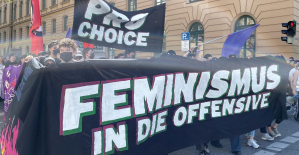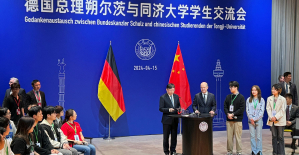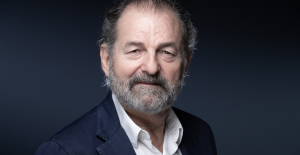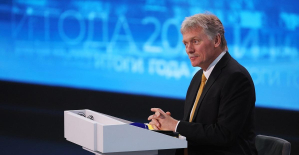Gathered in Sweden for the fourth edition of the Trade and Technology Council, the United States and the European Union pleaded on Wednesday for the rapid establishment of a voluntary "code of conduct" on artificial intelligence. The players in the sector would thus undertake to respect certain principles and guarantees in the development of their technologies. Such a device should see the light of day "in a few weeks", specified Margrethe Vestager, Vice-President of the European Commission, while Brussels is preparing legislation on artificial intelligence and facial recognition (AI Act), which, given its legislative process, would not take effect for two to three years. "It's obviously much too late", emphasizes Margrethe Vestager, in view of the "incredible acceleration" of the development of these applications, such as ChatGPT, from the company OpenAI, whose promoters she calls "responsible".
“It is important that we see that democracies can act”, she underlines, referring to an alliance on the subject with Canada, Japan or India. US Secretary of State Antony Blinken agrees, citing "the dire urgency" to meet this challenge with other like-minded countries. The EU wishes to define, together with the United States, the standards imposed on this new technology.
The Trade and Technology Council (TTC), created in 2021, brings the two powers together twice a year to coordinate their trade policies and technology standards. It was then a question of trying to put an end to years of transatlantic friction, in particular under the Donald Trump era. Margrethe Vestager boasts of positive results, including the definition of a common standard on chargers for electric vehicles. "Our interests are aligned," said Gina Raimondo, U.S. Secretary of Commerce. Antony Blinken praises a "remarkable convergence" of views between the two partners.
Behind these commitments, disagreements remain sharp between Americans and Europeans, in a context of growing geopolitical tensions and renewed protectionism. If Europeans had welcomed with relief the arrival of Joe Biden in the White House, who was full of declarations of friendship towards them, the reality remains that the slogan "America First" is more de rigueur than ever. . For months, Europe has been beefing up its response to the Inflation Reduction Act (IRA), a law adopted in August 2022 by the American Administration aimed at subsidizing, with 369 billion dollars of public money, the companies involved in the climate transition.
Between the lines of these rivalries between Western allies is also their respective approach vis-à-vis China. Americans have recently moderated their rhetoric about the alleged economic "decoupling" with the Beijing regime. “None of us is looking for a new cold war or decoupling, but for a reduction of risk in our supply chains,” assures Antony Blinken, echoing rhetoric from Ursula von der Leyen, president of the European Commission.

 Germany: abortions should be authorized up to 12 weeks, concludes a commission launched by Olaf Scholz
Germany: abortions should be authorized up to 12 weeks, concludes a commission launched by Olaf Scholz Knife attack in Australia: who are the two French heroes congratulated by Macron?
Knife attack in Australia: who are the two French heroes congratulated by Macron? Faced with an anxious Chinese student, Olaf Scholz assures that not everyone smokes cannabis in Germany
Faced with an anxious Chinese student, Olaf Scholz assures that not everyone smokes cannabis in Germany In the Solomon Islands, legislative elections crucial for security in the Pacific
In the Solomon Islands, legislative elections crucial for security in the Pacific Covid-19: everything you need to know about the new vaccination campaign which is starting
Covid-19: everything you need to know about the new vaccination campaign which is starting The best laptops of the moment boast artificial intelligence
The best laptops of the moment boast artificial intelligence Amazon invests 700 million in robotizing its warehouses in Europe
Amazon invests 700 million in robotizing its warehouses in Europe Inflation rises to 3.2% in March due to gasoline and electricity bills
Inflation rises to 3.2% in March due to gasoline and electricity bills Against drug trafficking, the mayor of Amsterdam advocates the regulation of cocaine
Against drug trafficking, the mayor of Amsterdam advocates the regulation of cocaine Hachette Livre removes Isabelle Saporta from management of Fayard
Hachette Livre removes Isabelle Saporta from management of Fayard Where is the MSC Aries, the ship boarded by Iran?
Where is the MSC Aries, the ship boarded by Iran? Denis Olivennes at Le Figaro: “CMI France discusses with Natacha Polony the future of Marianne”
Denis Olivennes at Le Figaro: “CMI France discusses with Natacha Polony the future of Marianne” 2024 Candidates Chess Tournament: Relive the Crucial Nepo-Gukesh Game
2024 Candidates Chess Tournament: Relive the Crucial Nepo-Gukesh Game Borgo, by Stéphane Demoustier: locked outside
Borgo, by Stéphane Demoustier: locked outside Release of hostages and immediate ceasefire: at the Venice Biennale, the Israeli pavilion resonates with Gaza
Release of hostages and immediate ceasefire: at the Venice Biennale, the Israeli pavilion resonates with Gaza Two Russian artists declared “terrorists and extremists” because of a play
Two Russian artists declared “terrorists and extremists” because of a play Skoda Kodiaq 2024: a 'beast' plug-in hybrid SUV
Skoda Kodiaq 2024: a 'beast' plug-in hybrid SUV Tesla launches a new Model Y with 600 km of autonomy at a "more accessible price"
Tesla launches a new Model Y with 600 km of autonomy at a "more accessible price" The 10 best-selling cars in March 2024 in Spain: sales fall due to Easter
The 10 best-selling cars in March 2024 in Spain: sales fall due to Easter A private jet company buys more than 100 flying cars
A private jet company buys more than 100 flying cars This is how housing prices have changed in Spain in the last decade
This is how housing prices have changed in Spain in the last decade The home mortgage firm drops 10% in January and interest soars to 3.46%
The home mortgage firm drops 10% in January and interest soars to 3.46% The jewel of the Rocío de Nagüeles urbanization: a dream villa in Marbella
The jewel of the Rocío de Nagüeles urbanization: a dream villa in Marbella Rental prices grow by 7.3% in February: where does it go up and where does it go down?
Rental prices grow by 7.3% in February: where does it go up and where does it go down? Europeans: the schedule of debates to follow between now and June 9
Europeans: the schedule of debates to follow between now and June 9 Europeans: “In France, there is a left and there is a right,” assures Bellamy
Europeans: “In France, there is a left and there is a right,” assures Bellamy During the night of the economy, the right points out the budgetary flaws of the macronie
During the night of the economy, the right points out the budgetary flaws of the macronie Europeans: Glucksmann denounces “Emmanuel Macron’s failure” in the face of Bardella’s success
Europeans: Glucksmann denounces “Emmanuel Macron’s failure” in the face of Bardella’s success These French cities that will boycott the World Cup in Qatar
These French cities that will boycott the World Cup in Qatar Bundesliga: Naby Keita suspended by Werder Bremen until the end of the season
Bundesliga: Naby Keita suspended by Werder Bremen until the end of the season Euro 2024: the Blues reveal their opponents for friendlies in June
Euro 2024: the Blues reveal their opponents for friendlies in June Cycling: De Marchi wins the 2nd stage of the Tour of the Alps
Cycling: De Marchi wins the 2nd stage of the Tour of the Alps Paris Olympics 2024: Joris Daudet (BMX) candidate to be French flag bearer
Paris Olympics 2024: Joris Daudet (BMX) candidate to be French flag bearer


















